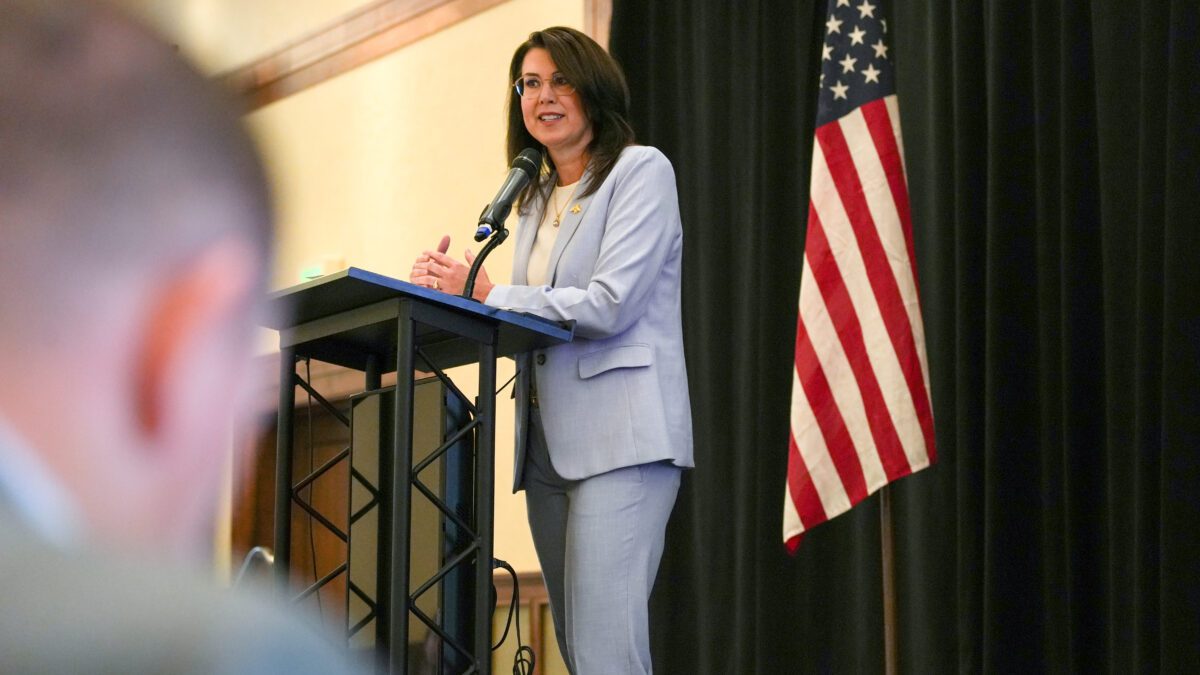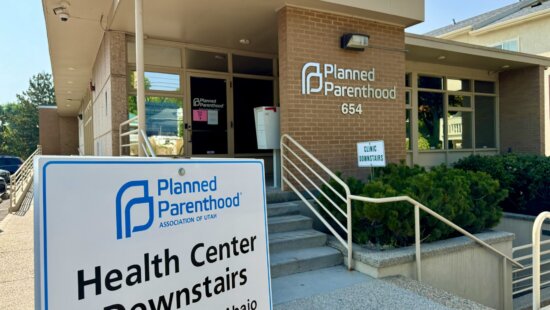Politics
Election fraud ‘boogeyman’: Republicans urge Utah to resign from ERIC voter roll cleanup group

Lieutenant Governor Deidre Henderson delivering a speech at the Tri-State Telecommunications Conference. Photo: Courtesy of the Utah Lieutenant Governor’s Office
Utah Lt. Gov. Deidre Henderson says the Electronic Registration Information Center is an important tool that’s under fire because it’s a ‘favorite boogeyman of radical election deniers’
By: Katie McKellar, Utah News Dispatch
Several Utah Republican county parties voted on Saturday to pass resolutions urging Utah’s top election officials and state leaders to end Utah’s membership with the Electronic Registration Information Center, also known as ERIC.
Republican delegates in Salt Lake, Weber and Davis counties voted to pass near matching resolutions, which specifically call on Utah Lt. Gov. Deidre Henderson, the state’s elections director and the Utah Legislature “by legislation if necessary” to “immediately tender Utah’s resignation from ERIC and join with other states who have undertaken similar action.”
The resolutions can’t force Utah to withdraw its membership — that would require further action from the lieutenant governor or the Legislature. Henderson has signaled she has no appetite.
Ahead of Saturday’s convention in anticipation of the resolutions, Henderson posted a thread on X explaining ERIC’s role and describing the attacks against it as nonfactual.
“ERIC has become a favorite boogeyman of the radical election deniers,” Henderson posted. “But their claims are not based in fact, and their demands are counterproductive to their rhetoric.”
🧵Today multiple GOP county conventions are running resolutions calling on me to extricate Utah from the Electronic Registration Information Center (ERIC). Ironically, the same resolution claims to care about cleaning up voter rolls and improving election security. 1/
— Deidre Henderson (@DeidreHenderson) April 13, 2024
While addressing the resolutions coming from county Republican parties, Henderson said, “ironically, the same resolution claims to care about cleaning up voter rolls and improving election security.” She described ERIC as “the best tool we have to keep our voter rolls clean.”
Utah’s membership in ERIC is “the only way we can tell if Utah voters are also registered to vote in another (member) state,” Henderson wrote. It’s also the only way the state can tell which voters have obtained driver licenses in another member state, as well as which voters have voted in another member state.
“Importantly,” Henderson added, it was because of ERIC that Utah “found 76 voters who voted in Utah AND another (member) state in 2022. These voters were immediately inactivated pending investigation and potential prosecution.”
After minimal debate Saturday, the Salt Lake County Republican Party approved the resolution on a standing vote, though a fair amount of delegates also voted against the measure.
The Davis County GOP approved the resolution on a 283-202 vote, and the Weber County GOP approved it by a majority standing vote.
Otto Kauss, the GOP delegate who sponsored the resolution at the Weber County convention, called ERIC “a politically driven voter registration scheme,” KSL TV reported. In contrast, another Weber County GOP delegate, Lance Peterson, spoke against the resolution. He said it contained “misinformation, distortions of fact. … Vet this a little bit better so it’s something we can be proud of.”
Why Republicans are attacking ERIC
Utah is not the first state where Republicans, driven by conspiracy theories and unfounded claims about election fraud, have urged their states to withdraw from ERIC. Last summer, Texas became the ninth state to resign from the national group that was created over a decade ago to combat voter fraud by helping clean up voter rolls.
Attacks on ERIC, a once non-controversial group and nonpartisan issue, spread across states after former President Donald Trump and other prominent Republicans began falsely accusing the group as a liberal plot to control the nation’s voter rolls.
In 2022, ERIC had 33 member states plus Washington D.C. Now, after Texas’ departure, the membership stands at 24 states plus D.C., which is notably one more than its membership in 2020.
In December, the nonprofit American Oversight, which describes itself as a “watchdog that advances truth, accountability and democracy by enforcing the public’s right to government records,” published a lengthy report titled “The Campaign to Dismantle ERIC.” That report uses thousands of pages of public records requests to detail in depth how “the election denial movement targeted ERIC as part of its continued effort to undermine U.S. democracy.”
That report found:
- “The same people who tried to overturn the 2020 election worked behind the scenes to influence the ERIC exodus by promoting false claims and conspiracy theories, priming states for post-election chaos that could be used to deny election results in 2024;
- “States have scrambled to find viable replacements — none of which provide ERIC’s security, reliability, or effectiveness; and
- “Election denial activists are now pushing their own ERIC alternatives that would make it easier to challenge the voting rights of thousands.”
What is ERIC, actually?
Since its creation in 2012, ERIC has been a voluntary option for states to compare their voter rolls with other member states. It provides election officials with information on potential inaccuracies in voter lists, which can trigger the process of removing voter names, something that is governed by state and federal law, according to the National Conference of State Legislators.
“To create the reports, ERIC compares records from member states. And to do that, ERIC receives voter registration and motor vehicle department information through a data-protected process. It also uses national change of address records and Social Security Administration death records,” according to NCSL. “The reports identify voters who appear to be registered in more than one state (or more than once within a state), along with information about voters who have died or moved. Each state then follows its own voter list maintenance protocol. ERIC does not amend any voter registration information, anywhere.”
As of March 31, ERIC has helped identify over 12.6 million out-of-state movers, more than 1.1 million in-state duplicates, and about 609,500 records of deceased voters, according to its website.
In March of last year, ERIC’s executive director Shane Hamlin issued an open letter seeking to “set the record straight” as misinformation around ERIC has spread.
“ERIC is a non-profit membership organization created by state election officials to help improve the accuracy of state voter rolls and register more eligible Americans to vote. This has been our mission since 2012,” Hamlin wrote.
He went on to describe ERIC as a “member-run, member-driven organization. State election officials — our members — govern ERIC and fund our day-to-day operations through payment of annual dues, which they set for themselves.”
“We analyze voter registration and motor vehicle department data, provided by our members through secure channels, along with official federal death data and change of address data, in order to provide our members with various reports,” Hamlin wrote. “They use these reports to update their voter rolls, remove ineligible voters, investigate potential illegal voting, or provide voter registration information to individuals who may be eligible to vote.”
🧵Importantly:
ERIC is the only way we can tell which voters voted in another (member) state.
Because of ERIC we found 76 voters who voted in Utah AND another (member) state in 2022. These voters were immediately inactivated pending investigation and potential prosecution. 4/
— Deidre Henderson (@DeidreHenderson) April 13, 2024
Hamlin said ERIC is “never connected” to states’ voter registration systems. “Members retain complete control over their voter rolls and they use the reports we provide in ways that comply with federal and state laws.”
The Utah county Republican party resolutions frame ERIC as being funded by George Soros, a liberal billionaire at the center of numerous conspiracy theories. In fact, ERIC was formed as a standalone nonprofit in 2012 with start-up funds from the nonpartisan Pew Charitable Trusts.
“While it received startup support from Pew during its first year and again in 2019 for one-time technology projects, it accepts no philanthropic funding,” according to the National Conference of State Legislators. “It does its work with a staff of three.”
The resolution also accuses ERIC of “violating the security of Utah registrants’ data by transmitting state data to third parties.” In a lengthy FAQ page on ERIC’s website, the nonprofit says it has not shared data with third parties for partisan purposes, saying it complies with applicable IRS regulations and federal data handling laws.




















